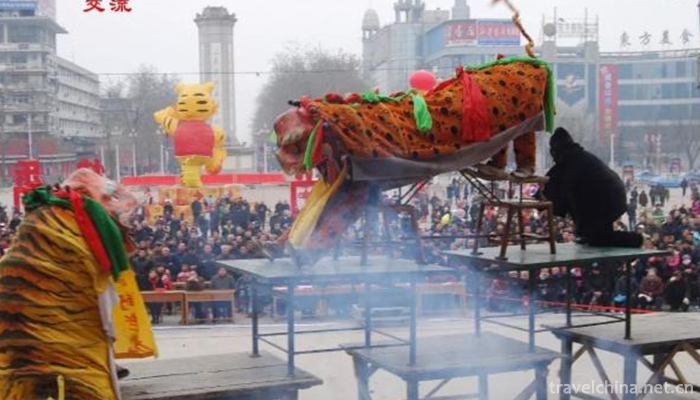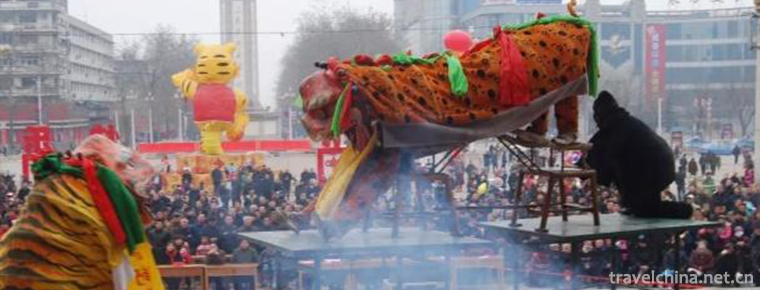Tiger dance shua laohu
Tiger dance shua laohu
Tiger dance, also known as "playing tiger" ("playing" Jiaozuo dialect refers to "playing" and "performing"), is said to have appeared in the Western Han Dynasty and spread in the middle reaches of the Yellow River. Jiaozuo "playing tiger" dance can be traced back to the Ming Dynasty. Jiaozuo's ancestors were inspired by tiger's boldness and action of Teng, Jump, Push and Lie. They created and compiled the traditional folk dance of tiger dance, also known as "playing tiger", with tiger's vigor, agility, vigor and dignity, integrating with local cultural characteristics, or martial arts, or sacrifice, or interpretation of local stories.
The tiger dance in Xizhou Village originated from the activities of sacrificial Association in Ming Dynasty. It went through five stages: emergence, development, decline, recovery and revitalization. From the end of Qing Dynasty to the beginning of the Republic of China to the 1930s, it was the first flourishing period. At that time, tiger dancing was combined with martial arts. Then it was inspired by traditional operas and folklore to strengthen its plot and interest, to compile the performance of instrument fighting tigers, and to arrange tiger table, chair and tower performances according to the characteristics of tiger's bravery and skillful climbing, so as to make tiger dancing in the village in a regular way. Mould and performance skills have been greatly improved, and many excellent performers have emerged. After the War of Resistance Against Japan, it gradually declined; after liberation, it gradually recovered; and in the 1990s, with the tide of reform and opening up, it has made great progress. From single tiger performance to group tiger performance in the past, personal performance technology has also been greatly improved. It can perform small and delicate performances on the stage and large-scale group tiger performances in the square. Therefore, no matter in artistic appreciation or in setting off a warm atmosphere, it has an irreplaceable role in other folk arts and shows its unique artistic value.
Xiaoshangcun, Zhongzhan, has a strong traditional national culture atmosphere. Tiger dance, a wonderful National culture, is rooted in this fertile land. Xiao Shang Tiger Dance was created by Zhang Shuting, the ancestor of Xiao Shang Village, in Daoguang Period of Qing Dynasty. Zhang Shuting practiced martial arts at an early age and was happy to participate in village temple fairs and festivals and traditional festivals. Around 1850, it combined martial arts with folk dances and folklores, and created the folk dance of "playing tigers". After more than 160 years of inheritance for 10 generations, it has gradually been refined into a classic folk dance composed of six road tiger stands, flat tiger, Hill tiger and mountain tiger. The tiger dance performance is composed of two parts: the honor Bang band and the tiger stand. The basic performing procedure is that in the sound of drum music and fire brass, all kinds of martial arts actors shout for encouragement and play, and then the tiger players with guns enter the arena first, tease the tiger with martial arts routines, and with the surging rhythm, sound of fire brass, the tiger dance makes a flutter, bite, toss and tosses on the arena or on the high platform (hills, mountains). Move, jump and other dangerous movements, and around the field performance, or rapid running, jump, or slowly move its performance scene is magnificent and warm, on-site and off-site echoes, shaking the world. The whole performance was successful in stimulation and oscillation. It was very ornamental and artistic.


-
1.Lianhua Rural Tourist Area
Lianhua Rural Tourist Area is a national AAAA-level tourist area, located in the northeast of Chenghai District, Shantou City, with Dongli Town in the East and Tiepu Town in Chaozhou City in the west
Time 2019-01-29 -
2.Shi Bao Village
Shibaozhai, a national AAAA-level tourist attraction, a national key cultural relic protection unit, is one of the 30 best new tourist landscapes in the Three Gorges of the Yangtze River,
Time 2019-02-08 -
3.Eight Delicacies Rice
The traditional name of Ningbo is Laba Festival Food. It is made from raw materials such as glutinous rice, bean paste, jujube paste, preserved fruit, lotus seed, rice kernel, longan, sugar and pig fa
Time 2019-03-25 -
4.Tibetan Medicine
Tibetan medicine is a bright pearl in the treasure house of Chinese medicine. The Tibetan people living in the snow-covered plateau for generations have accumulated
Time 2019-04-05 -
5.Traditional medicine
Traditional medicine, a list item of intangible cultural heritage. Article 21 of the Constitution stipulates that the State shall develop medical and health undertakings, modern medicine and tradition
Time 2019-04-21 -
6.Lotus fall lian hua lao
Lotus Flower is a kind of traditional folk art with both rap and singing. The performers are mostly one person, self-talk and self-sing, self-play seven pieces of accompaniment.
Time 2019-05-13 -
7.The Tu nationality in Yuqiu
Tu nationality, spread in Nianduyu Village, Tongren County, Qinghai Province, is a unique local folk culture form. It is held from November 5 to 20 of the lunar calendar every year. It includes ceremo
Time 2019-06-23 -
8.Wan Bang
Wan Bang is a rare local opera. It grows and distributes in Nanyang in southwestern Henan and its surrounding areas. In the early days, people called it Hao Bang, Lao Bang Zi, Nanyang Bang Zi, etc. Be
Time 2019-06-25 -
9.Yangge Dance
Yangge is a popular and representative folk dance genre in China (mainly in the northern region). There are different appellations and styles in different regions. In folk, there are two kinds of appe
Time 2019-07-10 -
10.A city with a fire by one Cold thinking behind Ding Zhen hot
With the popularity of microblogging for nearly seven months, the popularity of microblogging has been created for a long time. At the same time, the hometown of Ding Zhen, Litang County, Ganzi Tibetan Autonomous Prefecture, also ushered in several times the search volume and real gold and silver tourism orders.
Time 2020-12-07 -
11.Panzhihua scenic spot
Gesala Ecotourism Area is a national AAAA tourist attraction, a provincial tourist resort and a provincial ecotourism area. It is located in the northwest of Panzhihua City, about 110 km away from the urban area. There are ten thousand acres of pines, azalea sea, Yi People's customs and Tiankeng floor drain.
Time 2020-12-14 -
12.Guangan secondary industry
In 2019, the industrial added value of Guang'an City will reach 28.87 billion yuan, an increase of 8.8%, and its contribution rate to economic growth will be 34.9%. At the end of the year, there were 597 Industrial Enterprises above Designated Size, and
Time 2020-12-19